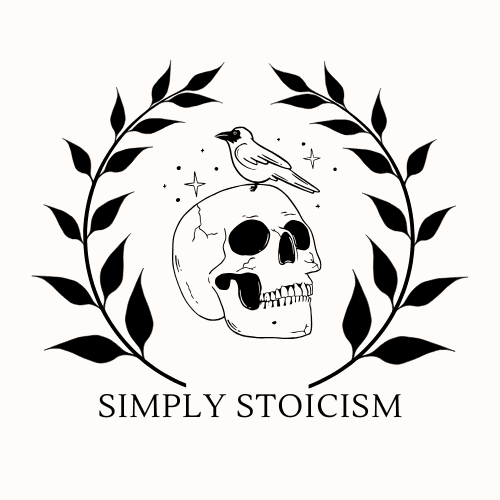The Stoic's Guide to Information Overload: Ancient Wisdom for Modern Attention
Learn how Marcus Aurelius's timeless system for managing information overload can transform your digital life. Discover the 3-part Stoic framework used by history's greatest leader to find clarity in chaos

Jon High
·
Dec 29, 2024
Your phone buzzes with another notification while you're scanning through an endless stream of unread emails. Three messaging apps demand your attention. Your news feed warns of five different crises you should be worried about. And your boss just dropped another "urgent" request in Slack.
Sound familiar?
We're drowning in information. The average knowledge worker now switches tasks 373 times during a typical workday. We consume about 34GB of information daily – enough to overload a laptop. Our brains, evolved for a world of scarce information, are struggling to cope with this endless flood of inputs.
But what if I told you that one of history's most effective leaders faced a similar challenge – and developed a bulletproof system for maintaining clarity amid chaos?
Marcus Aurelius, Emperor of Rome, had to process countless reports, messages, and requests daily. Military dispatches, diplomatic communications, administrative decisions, personnel issues – the information load of running an empire was staggering. Yet he managed to maintain not just effectiveness, but remarkable mental clarity and philosophical calm.
His secret? A systematic approach to managing information and attention that's more relevant today than ever.
The Emperor's Inbox: How Marcus Handled Information Overload
Before we dive into Marcus's solutions, let's understand what his daily information processing looked like. As emperor, he faced:
Military reports from multiple frontiers
Diplomatic messages from foreign kingdoms
Administrative updates from governors of numerous provinces
Legal cases requiring imperial judgment
Personal requests from senators and citizens
Political intrigues and rumors requiring evaluation
Economic data from across the empire
Sound overwhelming? It should. Marcus was essentially running the ancient world's largest organization, without computers, smartphones, or even paper as we know it.
Yet in his personal writings (which would become "Meditations"), he reveals a sophisticated system for maintaining mental clarity amid this chaos. Here's what he wrote:
"Don't waste time on useless things... You need to avoid certain things in your train of thought: everything random, everything irrelevant... Keep yourself simple, good, pure, serious, and unassuming; the friend of justice and godliness; kindly, affectionate, and resolute in your devotion to duty."
This wasn't just philosophical musing – it was practical advice born from managing an empire's worth of information. And it gives us the framework we need for our modern challenges.
The Stoic Framework for Digital Focus
Marcus's approach can be broken down into three core disciplines that map perfectly to our modern needs:
1. Perception: Filtering Input
The first step is learning to distinguish between what deserves your attention and what doesn't. Marcus writes:
"Most of what we say and do is unnecessary: remove the superfluity, and you will have more time and less bother."
Modern Application:
Set up aggressive email filters to catch non-essential messages
Turn off notifications for all but the most critical apps
Create designated times for checking social media and news
Use the "touch it once" rule: when you open an email or message, decide immediately what to do with it
2. Action: Processing What Matters
For information that does deserve attention, Marcus advocated systematic processing:
"First, don't be overwhelmed by the quantity... Then analyze what each one demands of you."
Modern Application:
Use the 4D method for all incoming information:
Delete (if unnecessary)
Delegate (if someone else should handle it)
Defer (schedule for later if not urgent)
Do (if urgent and important)
Create standardized responses for common requests
Build decision trees for recurring types of information
Use time-blocking to batch similar information processing tasks
3. Will: Maintaining Mental Sovereignty
Perhaps most importantly, Marcus emphasized maintaining independence from external demands:
"The mind in itself has no needs, except for those it creates itself."
Modern Application:
Start your day with focused work before opening email
Practice regular digital detoxes
Create clear boundaries between work and personal time
Develop a "mental citadel" through daily reflection
Implementation Guide: Building Your Modern Stoic Information System
Here's how to put this into practice:
Morning Routine:
10 minutes of reflection before touching any devices
Review your priorities for the day
Exercise (go for a walk, hit the gym, etc.)
One hour of focused work on your most important task
Only then begin processing incoming information
Digital Workspace Setup:
Create separate spaces for different types of work
Set up automation for recurring information processing
Use tools like Freedom or RescueTime to block distractions
Implement a simple filing system for reference materials
Common Obstacles and Solutions:
FOMO (Fear of Missing Out)
Marcus's advice: "Very little is needed to make a happy life."
Modern application: Set up curated information feeds for truly essential updates
Pressure to Be "Always On"
Marcus's advice: "People try to get away from it all... You have the ability to strip away all that is not essential."
Modern application: Establish clear communication protocols with your team
Information Anxiety
Marcus's advice: "If you are distressed by anything external, the pain is not due to the thing itself, but to your estimate of it."
Modern application: Create a weekly review process to ensure nothing important slips through the cracks
The Deeper Purpose
Remember: The goal isn't just productivity – it's tranquility. As Marcus wrote, "Nowhere can man find a quieter or more untroubled retreat than in his own soul."
By implementing these Stoic principles, you're not just managing information better. You're creating space for what truly matters: deep work, meaningful relationships, and personal growth.
Start Today:
Choose one principle from this guide to implement
Practice it consistently for one week
Reflect on the changes in your mental clarity and effectiveness
Remember Marcus's words: "Very little is needed to make a happy life; it is all within yourself, in your way of thinking."
Your peace of mind is worth more than staying up to date with every piece of information that crosses your path. Start building your modern Stoic information system today.



